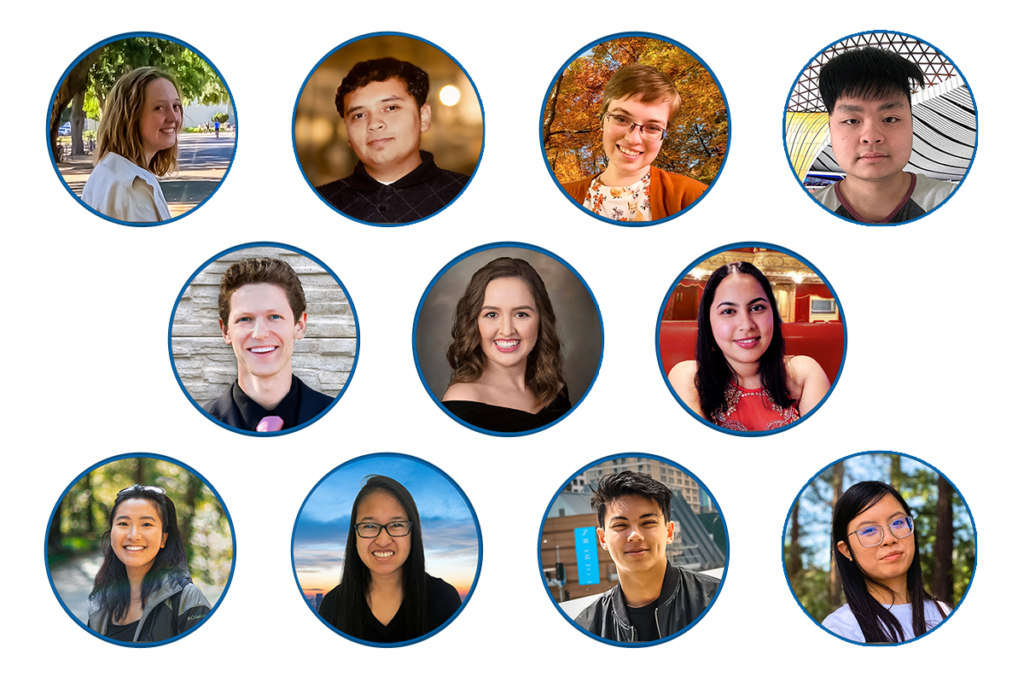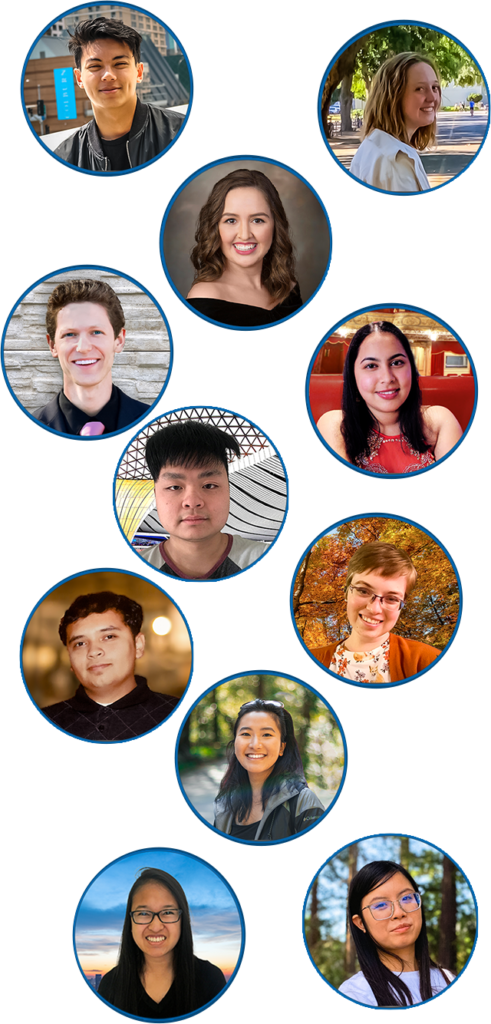Discourse Lab
THE TEAM

THE TEAM
Discourse Lab

Discourse Lab
THE TEAM

Welcome to the website of UC Davis’s Discourse Lab. Professor Vaidehi Ramanathan and I started the Discourse Lab with the goal of training undergraduate students to analyze the use of language in various forms of discourse. The lab allows early researchers to have first-hand experience in navigating the different stages and approaches involved in the study of discourse. Lab researchers are trained in dialogue transcription, utterance coding, corpus building, data gathering, and analysis, among others. All of us, in our own ways, engage in discourse to construct meaning, which is why the lab provides both Linguistics and non-Linguistics majors the opportunity to learn more about language science.
– Peter Torres
PhD Candidate, Linguistics
Lab supervisor
Our Team
Professor Ramanathan and I are glad that the following researchers joined our team.

Haley Vandermey
Lead Researcher
Haley is interested in understanding how individuals with varying exposure to the diagnosis and treatment of breast cancer linguistically negotiate the idea of healing. In her undergraduate project, Haley analyzes elicited testimonials on breast cancer and remission to show how recovery is framed in discourse.
Haley currently attends CSU East Bay’s Speech-Language Pathology program as a graduate student.

Naina Narain
lead Researcher
Naina is interested in the linguistic representation of normalcy and healing of individuals dealing with often-invisible conditions such as social anxiety and depression. In her undergraduate project, Naina documents the language use of individuals suffering from mental health issues and how their linguistic representations evolve as they transition towards healing. Particularly, Naina interviews and follows the journey of young individuals who write blogs and post videos about mental health. Using prosodic and written discourse analyses, Naina investigates how these individuals represent themselves in their interviews as well as both their written and video blogs. As for other research interests, Naina is also a member of the Language Learning Lab and is researching done research on how prosody in child-directed speech relate to learning. As a member of the Phonetics Lab, Naina also studies variations in AI-directed speech.

Dustin Nguyen
Senior Researcher
Dustin’s undergraduate project explores the ways in which linguistic expressions of despair and suffering in online platforms help individuals with anorexia recontextualize the notion of healing. Dustin worked on a corpus of blog posts from the same sources to show how their representations of the condition and recovery changes across time.

Alexander Shaban
Senior Researcher
Alex’s undergraduate research focuses on how the language surrounding the dominant ideologies of a normative body affects how the self-identified “underdogs” and “misfits” view themselves, their body, and healing. Alex connects the notion of recontextualization by Bauman and Briggs (1990) to the realm of Language and Bodies to highlight how meaning-making allows the members of marginalized communities of practice to creatively use previously derogatory language to empower themselves.

Ava Anderson
senior Researcher

Melanie Yoon
Researcher, specialist
Melanie experienced first-hand the growing presence of western culture in Malaysia—through technology, the media, travel, and commerce. Melanie wanted to investigate whether globalization has found its way into the language attitudes of Malaysian Gen Z’s who are attending universities in countries within Kachru’s inner concentric circle (USA, Australia, and the United Kingdom). Through interviews, Melanie showed how growing western influences have resulted in an overwhelmingly positive response towards non-Malay English variants and a negative view of Malaysian English. Melanie also singled out the prosodic cues used by young Malaysians as they share their thoughts towards Malaysian English using the very same language. Such attitude stems primarily from the burden of communication falling more heavily on Malaysian speakers when communicating with English speakers from their host nations. As a researcher of the Language Learning lab, Melanie’s undergraduate thesis is on the role of infant-directed action towards infant attention, comparing monolingual and bilingual groups. By observing play sessions, her research offers a naturalistic take on studies usually performed in labs.
Melanie is currently pursuing a Masters of Medical Science in Speech and Language Therapy at The University of Sheffield.

Hannah Brown
Researcher,
Discourse Analyst
Hannah’s research interests are discourse analysis and computational sociolinguistics, particularly on the language surrounding domestic violence and mental health.
Hannah conducted a study on the linguistic representation of PTSD as well as the linguistic markers of group membership by conducting interviews of young adults, some of whom are dealing with the condition. Hannah is interested in learning about the linguistic representation of PTSD and healing by those who identify as members of the PTSD community and those who do not. By pointing out the meta messages from their responses, Hannah found that the recontextualization of normalcy guides sufferers through the recovery process. Moreover, Hannah found that each group use language in very particular ways to signal their membership.
Hannah currently attends the National University of Singapore as a Ph.D. student in Natural Language Processing.

Jesus Carrillo
Alvarez
Researcher,
Discourse Analyst
Jesus wanted to disaggregate the data on the language attitudes of Spanish English bilinguals towards bilingualism by highlighting the unique stories of young Mexican bilingual immigrants living in California, particularly those belonging to the Generation Z. Jesus wanted to uncover whether recent years of heightened globalization have caused the bilinguals to have a more positive attitude towards their own minority language in contrast to the findings presented in similar previous studies. While Jesus found that the positive language ideologies associated with English remain strong, participants have also expressed a growing positive attitude toward bilingualism, citing the importance of knowing Spanish in today’s economy.
Jesus is currently pursuing a Master of Science degree in Speech-Language Pathology at San José State University.
Alumni

Melissa Mateo
Senior Researcher
Melissa has volunteered for speech therapists and has worked for the Center for Autism and Related Disorders, which explains why her interest in conducting an undergraduate project that investigates how individuals who have undergone speech therapy represent the notion of “normalcy” and “disability” in relation to their conditions. In a metalinguistic way, Melissa analyzes how individuals described as having linguistic issues linguistically represent themselves,

Andrew Mendoza
Lead Researcher
Andrew worked on a project that sheds light on the stigmas behind mental health conditions by analyzing prosody in conversations about Obsessive-Compulsive Disorder. Andrew focuses on pitch, speed, intensity, and use of pauses to show how interlocutors portray certainty and uncertainty as well as establish credibility.
Our Team
Professor Ramanathan and I are glad that the following researchers joined our team.

Haley Vandermey
lead Researcher
Haley is interested in understanding how individuals with varying exposure to the diagnosis and treatment of breast cancer linguistically negotiate the idea of healing. In her undergraduate project, Haley analyzes elicited testimonials on breast cancer and remission to show how recovery is framed in discourse.

Naina Narain
lead Researcher
Naina is interested in the linguistic representation of normalcy and healing of individuals dealing with often-invisible conditions such as social anxiety and depression. In her undergraduate project, Naina documents the language use of individuals suffering from mental health issues and how their linguistic representations evolve as they transition towards healing. Particularly, Naina interviews and follows the journey of young individuals who write blogs and post videos about mental health. Using prosodic and written discourse analyses, Naina investigates how these individuals represent themselves in their interviews as well as both their written and video blogs. As for other research interests, Naina is also a member of the Language Learning Lab and is researching done research on how prosody in child-directed speech relate to learning. As a member of the Phonetics Lab, Naina also studies variations in AI-directed speech.

Dustin Nguyen
Senior Researcher
Dustin’s undergraduate project explores the ways in which linguistic expressions of despair and suffering in online platforms help individuals with anorexia recontextualize the notion of healing. Dustin worked on a corpus of blog posts from the same sources to show how their representations of the condition and recovery changes across time.

Alexander Shaban
Senior Researcher
Alex’s undergraduate research focuses on how the language surrounding the dominant ideologies of a normative body affects how the self-identified “underdogs” and “misfits” view themselves, their body, and healing. Alex connects the notion of recontextualization by Bauman and Briggs (1990) to the realm of Language and Bodies to highlight how meaning-making allows the members of marginalized communities of practice to creatively use previously derogatory language to empower themselves.

Ava Anderson
senior Researcher

Melanie Yoon
Researcher
Melanie experienced first-hand the growing presence of western culture in Malaysia—through technology, the media, travel, and commerce. Melanie wanted to investigate whether globalization has found its way into the language attitudes of Malaysian Gen Z’s who are attending universities in countries within Kachru’s inner concentric circle (USA, Australia, and the United Kingdom). Through interviews, Melanie showed how growing western influences have resulted in an overwhelmingly positive response towards non-Malay English variants and a negative view of Malaysian English. Melanie also singled out the prosodic cues used by young Malaysians as they share their thoughts towards Malaysian English using the very same language. Such attitude stems primarily from the burden of communication falling more heavily on Malaysian speakers when communicating with English speakers from their host nations. As a researcher of the Language Learning lab, Melanie’s undergraduate thesis is on the role of infant-directed action towards infant attention, comparing monolingual and bilingual groups. By observing play sessions, her research offers a naturalistic take on studies usually performed in labs.

Hannah Brown
Researcher, discourse analyst
Hannah’s research interests are discourse analysis and computational sociolinguistics, particularly on the language surrounding domestic violence and mental health. Hannah conducted a study on the linguistic representation of PTSD as well as the linguistic markers of group membership by conducting interviews of young adults, some of whom are dealing with the condition. Hannah is interested in learning about the linguistic representation of PTSD and healing by those who identify as members of the PTSD community and those who do not. By pointing out the metamessages from their responses, Hannah found that the recontextualization of normalcy guides sufferers through the recovery process. Moreover, Hannah found that each group use language in very particular ways to signal their membership. Hannah will be attending the National University of Singapore as a Ph.D. student in Natural Language Processing

Jesus Carrillo
Alvarez
Researcher, discourse analsyt
Jesus wanted to disaggregate the data on the language attitudes of Spanish English bilinguals towards bilingualism by highlighting the unique stories of young Mexican bilingual immigrants living in California, particularly those belonging to the Generation Z. Jesus wanted to uncover whether recent years of heightened globalization have caused the bilinguals to have a more positive attitude towards their own minority language in contrast to the findings presented in similar previous studies. While Jesus found that the positive language ideologies associated with English remain strong, participants have also expressed a growing positive attitude toward bilingualism, citing the importance of knowing Spanish in today’s economy.
Alumni

Melissa Mateo
Senior Researcher
Melissa has volunteered for speech therapists and has worked for the Center for Autism and Related Disorders, which explains why her interest in conducting an undergraduate project that investigates how individuals who have undergone speech therapy represent the notion of “normalcy” and “disability” in relation to their conditions. In a metalinguistic way, Melissa analyzes how individuals described as having linguistic issues linguistically represent themselves,

Andrew Mendoza
lead Researcher
Andrew worked on a project that sheds light on the stigmas behind mental health conditions by analyzing prosody in conversations about Obsessive-Compulsive Disorder. Andrew focuses on pitch, speed, intensity, and use of pauses to show how interlocutors portray certainty and uncertainty as well as establish credibility.


